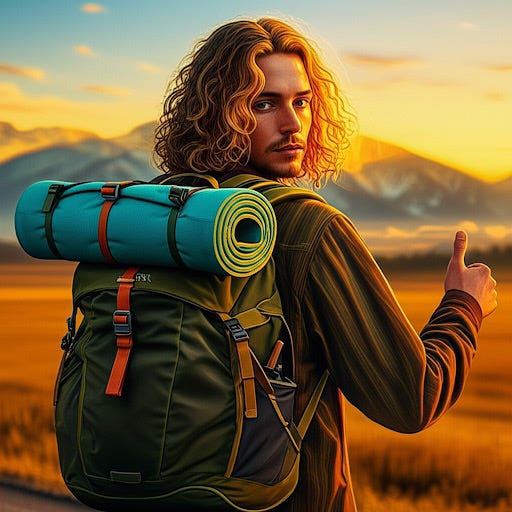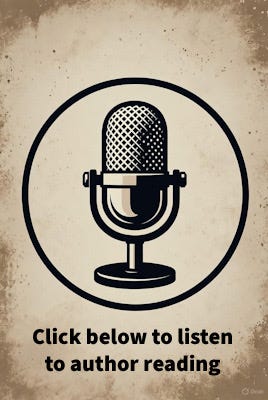Full Table of Contents: Surfing the Interstates: Complete Chapter Guide
Chapter One: Thumb Out
Tossing and turning, I finally awake. Twenty-one and broke. Already past noon, the mid-July sun in its full glory. I've been crashing in Ledge Acres' servant's quarters in the back of our sprawling 1865 farmhouse. Jimmy Matsudo's old room. One foot already out the door.
We've lived here thirteen years. Twenty-five acres at the end of a dirt road, an hour from Grand Central Station. Close enough for my father's daily commute, far enough to pretend we're living in Vermont.
Jimmy was our live-in gardener when I was ten. Japanese man with some dark story about killing someone. My father didn't seem to mind leaving him with Mama and us kids while he worked in the city. Jimmy was an older guy, athletic and hardworking, but surprisingly gentle. Once I spied him through his window while he meditated—sitting cross-legged, placing incense cones on his knees, letting them burn all the way down without flinching. He taught me so many things that stayed with me. Pet a dog's cheek in circles with your knuckles, he'll be your friend for life. Twist your ankle? Lie on your back, raise your foot, and shake it until it feels better. How to take plant cuttings and root them in sand.
Getting up. Survey the clutter. 1935 Harmony Cremona, I've nicknamed "Mona," safe in her hard case. Brand new Kelty backpack loaded—tent, sleeping bag, mess kit, few days' food. Sony cassette deck with carefully recorded mix tapes: Dead, Allmans, Airplane, CSN. Colombian weed and Bambus tucked away. Water bottle full. Everything I own.
Wander the empty house. My father—moved to the city. The younger kids—scattered to camps and day school. My two older sisters—somewhere. My mother—has taken Nana to the Senior Center.
Passing the living room doorway. Stop.
The July heat can't erase the ghost of that first Christmas at Ledge Acres. I was eight, trying out my new downhill skis in the front yard when something made me turn back toward the house. Through that window—God, that window—I saw everything. Home. Family. What it meant to belong somewhere. I stood transfixed, leaning into my poles, watching the glow from that beautiful tree Nana had decorated with tinsel, one strand at a time. Hours of patient work, each piece placed with loving care. The pillaged presents spread out for yards around, the fire crackling. Everyone inside together—my sisters in matching nightgowns, my brother toddling around in footie pajamas. My mother's face soft with exhaustion and joy. Even my father looked content, sipping ginger ale in his wingback chair. Thirteen years ago. Before things fell apart. Before we learned to walk on eggshells. Might as well have been a different family.
Kitchen. Silent. No smell of Sunday roast. No Nana making Toll House cookies. Just the refrigerator's hum. From the laundry room—washing machine churning.
Last year I was passing by when movement through the open door caught my eye. My father had my mother pressed against the dryer, holding her wrist with one hand, backhanding her with the other. The sound of it—sharp, final. Just a glimpse, but enough to see her body go limp, accepting it. His face in profile: angry, unhinged, like he was whipping a horse. The same man who'd given me the belt when I was nine for hitting my sister. "You never hit a woman," he'd said, making me drop my pants for the punishment. "Never." The righteousness in his voice as leather met skin. The lesson he was teaching his son. And here he was, the son of a French count, hitting my mother while the washing machine covered the sound. My mother, who'd given him six children. Who'd moved seven times for his ambitions. I slipped away, unnoticed. Never said a word to anyone. What was there to say? Who would believe it? Even now, my hands make fists remembering. But I did nothing.
My parents' room. Something draws me to the small closet near my mother's dresser. Inside a tin box. Beneath some jewelry—a roll of twenties. Four bills. Eighty dollars.
Pulse quickens. Adrenaline.
Here we are, both fleeing the same prison. She divorcing, me desperately suffocating. We're learning the same lesson - when push comes to shove, you save yourself first. Should I leave a note? No time. She'll understand. Like finding an escape hatch in a sinking submarine. I've read Kerouac. The road is calling. I pocket the bills.
Back to Jimmy's room. Wrestle the backpack straps onto my shoulders. Grab my guitar. Down the hall. Out the door. Past the lilac bushes lining the gravel driveway.
Turn back once more. The weeping willow my mother loves. Stone wall with its massive staircase. Tired white farmhouse. Stately oak. Bittersweet farewell. Divorce final. Estate under contract. Two thirds of my life lived here. End of an era.
Hiking down the mile-long dirt road. Feeling the full weight of my carefully selected burden—pack, 35 lbs—Mona in her battered but still bulletproof case, 15 lbs. Final hill's crest—glimpse the stone aqueduct leading to Byram Lake. Fond memories of my dad taking me fishing years ago flood back, somehow softening my resentment, tugging weakly at my resolve to leave. I flash on that time he hooked a massive brown trout in the Mianus River Gorge, yelling for the net. The image of it jumping out of the water, sun reflecting on its impossible speckles—gone in an instant. My father, scowling, blaming me for his loss. My resolve restored. What is it that makes a father so controlling, so intrusive, so demanding, so unforgiving?
Cross a small marsh, scramble up a bank to the shoulder of 684. Light traffic—already 3 pm. Cross the four lanes, shed my load, sweating, nervous, facing the oncoming traffic. Thumb out like a rookie matador's muletta.
Destination: Santa Rosa, where my college buddy Steve has fixed up an old chicken coop and says I'm welcome. California—land of gold rush and redwoods, the Dead and the Airplane. The mythical land of our hippy dreams.
A Trans Am pulls over a hundred yards ahead. I grab my stuff and run.
Not ideal—muscle car driven by an athletic guy who looks like Burt Reynolds. You want a fellow longhair or at least someone vaguely friendly. But beggars can't be choosers.
"Where you headed?"
"California."
"I can take you to 84 West. Twenty minutes."
I throw my stuff in back and climb in. My benefactor, a 34-year-old Vietnam vet. The war ended five months earlier.
"You in school?" he asks, glancing at my hair.
"Was. Penn. Dropped out."
"Smart. I never made it to college. Got my education in the jungle." His jaw tightens. "You get drafted?"
"Number 200. They only took through 160."
"Lucky fuck." He lights a Marlboro, offers me one—gladly accept. "My little brother wasn't so lucky. Came home in a box."
"I'm sorry."
"Yeah, well. That's what happens when politicians play war games with other people's kids." He takes a hard drag. "What would you have done if they'd called your number?"
I hesitate. "My buddy Steve—the guy I'm heading to see—he drew number 1."
"No shit?"
"Got a shrink at school to write him up as a 4F. Psychological."
The vet snorts. "Smart kid. And you?"
"We were both ready to go to Canada if we had to. No way we were going to Nam."
His knuckles whiten on the steering wheel. I brace for anger—he just nods slowly.
"Can't say I blame you. I went because I didn't know any better. Poor kid from Bridgeport, what the hell did I know? Thought I was being patriotic." He flicks ash out the window. "Your old man must have loved that—you ready to run to Canada."
"My father?" I laugh bitterly. "He took me to West Point for an interview before I even started college. Already at Penn when the lottery came up, he said I should do ROTC. 'Might as well go as an officer,' he said. Like dying with bars on your shoulders made it noble."
"Jesus." The vet shakes his head. "My old man was the opposite. Cried like a baby when I shipped out. He'd been at Normandy."
"Mine never served. Too young for World War Two, too connected for Korea."
"Figures. It's always the ones who never went who are ready to send everyone else." He points to the exit coming up. "This is you."
As he pulls over, he turns to me. "Look, kid. I don't know if you're a coward or the smartest guy I've met today. But I saw eighteen-year-olds die face-down in rice paddies for no goddamn reason. So you and your buddy Steve? You made the right call."
I grab my gear. "Thanks for the ride."
"Yeah." He studies me. "Word of advice? That hair's gonna make it tough getting rides with some people. Lot of guys came back real angry about kids like you. Be careful out there."
Standing in the blazing sun, I've made it twenty minutes north and learned something: 1973 is complicated. The war is over but not really. Some vets understand why we resisted. Others won't. My father wants me to die with honor. This stranger who's actually been there is telling me I was right to refuse.
Setting up for ride number two, I take a deep breath and wait.
Forty-five minutes. Cars streaming past. Backpack straps cutting into my shoulders, guitar case growing heavier. A state trooper cruises by, eyeing me. I try to look harmless.
Finally, a primer-gray Dodge van pulls over. Rhode Island plates. The passenger window rolls down. A woman with tangled blonde hair and dilated pupils leans out.
"Where you headed, sunshine?"
"California, but anywhere west helps."
She turns to the driver—thin guy with a scraggly beard, tank top showing track marks. "Baby, he's going to California!"
"We're going to Wilkes-Barre," the guy says. "That work?"
"Perfect."
I climb in back. No seats, just a mattress and milk crates. Incense can't mask the smell of weed and something chemical. The woman twists around.
"I'm Rainbow. This is Derek. We're getting his bike!"
"A '72 Sportster," Derek adds. "Guy's holding it for me. Cash deal."
Rainbow touches his arm constantly as he drives, like she needs to confirm he's real. They pass a joint back and forth, offer it to me. I take a small hit to be polite, not knowing what else might be mixed in.
"You two been together long?"
"Six months," Rainbow says.
"Eight months," Derek corrects.
"Time's just a construct," she laughs, that high tinkling laugh. "We're cosmic twins. Tell him about the festival, baby."
Derek launches into a story about meeting at some Vermont rainbow gathering. She keeps interrupting to add details he's getting wrong. They bicker like they've been married for years, but she punctuates every disagreement with "I love you so much" and he responds "Love you too, babe."
"You got an old lady?" Rainbow asks.
"No."
"You will in California. California's where love lives."
They drop me south of Wilkes-Barre as darkness falls. Derek shakes my hand. Rainbow hugs me, pressing her whole body against mine, her breasts soft through the thin fabric of her dress. She smells like patchouli oil and sweat and something earthier, female. Her lips brush my ear as she whispers, "Stay golden, sunshine." Her breath warm, sending an unexpected shiver through me.
I watch them drive off to find their motorcycle, still touching, still reassuring each other. My body holds the ghost of her embrace, the warmth of her whisper still tingling my ear.
→ Next Chapter: Turn On Your Love Light - Andre's transformative Grateful Dead concert flashback
Full Table of Contents: Surfing the Interstates: Complete Chapter Guide
🎒 What was your most dramatic moment of leaving home or breaking free? Share your own escape stories in the comments.
This is Chapter 1 of 16 in my complete 1973 hitchhiking memoir.





Keep writing!! ♥️